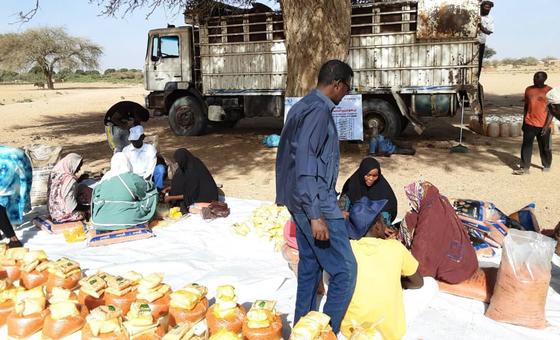In the past month, WFP supported more than 300,000 people there with food, including 40,000 in El Fasher, the capital of North Darfur state.
“We must be able to reach those who need us most in Sudan,” Executive Director Cindy McCain wrote in a post on social media.
Separately, UN Humanitarian Affairs Coordinator Martin Griffiths warned that an escalation of hostilities there would be “catastrophic”.
Civilians in El Fasher are already struggling to survive hunger and deprivation, and they must be spared from violence, he wrote on social media.
El Fasher has more than 330,000 people facing acute food insecurity, and nearly half of its residents are internally displaced.
Over the weekend, the UN Security Council appealed for the warring parties in Sudan to immediately halt the military build-up and take steps to de-escalate the situation in El Fasher.
The call came amid reports of an imminent offensive by the Rapid Support Forces (RSF) and their allied militia, which could threaten the lives of hundreds of thousands of displaced persons currently sheltering in the city.
Iraq urged to shelve new law criminalising same-sex relations
The UN human rights office, OHCHR, has urged Iraq to discard a new law that criminalises consensual same-sex relations and other forms of private consensual behaviour with heavy jail sentences.
“The law runs contrary to several human rights treaties and conventions ratified by Iraq, including the International Covenant on Civil and Political Rights, and should be shelved,” spokesperson Ravina Shamdasani said on Monday.
She added that “everyone, without distinction, is entitled to enjoy all human rights, including the right to privacy, the right to be treated as equal before the law and the right to protection from discrimination on various grounds that include sexual orientation and gender identity.”
Under the new law, those found guilty of “establishing a homosexual relationship” will face 10 to 15 years in jail, while anyone who “promotes homosexuality” will be imprisoned for at least seven years and fined at least 10 million Iraqi dinars (approximately $7,600).
Additionally, anyone accessing or performing gender-affirming medical treatments will face up to three years behind bars, and people who dress in clothing associated with the opposite gender will receive jail terms of up to three years or a fine of at least 5 million Iraqi dinars.
Chad: Guterres appeals for restraint ahead of presidential election
UN Secretary-General António Guterres has urged stakeholders in Chad to ensure a peaceful, inclusive, transparent and credible vote as the country prepares for the first round of presidential elections next week.
“The Secretary-General encourages all political leaders to refrain from any acts or discourse that could undermine a peaceful process, to overcome any disagreements through dialogue and to address complaints that may arise through established legal channels,” his spokesperson said on Monday.
Chadians go to the polls on 6 May. The elections are part of the transition back to democracy after three years of military rule following the death of President Idris Deby in April 2021.
The longtime leader died fighting rebels in the north and his son, Mahamat Idriss Deby, was installed as head of the Transitional Military Council.
The younger Mr. Deby promised a return to civilian rule and elections within 18 months, but extended the transition by two years.
The Secretary-General reiterated UN commitment to continue to support efforts towards building a peaceful and prosperous future in Chad.

